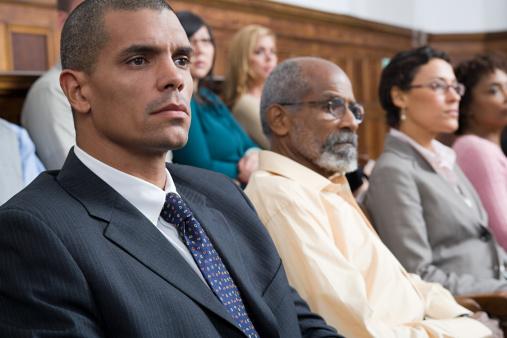
Jury nullification occurs when a jury returns a verdict that is contrary to the law provided to them by the court. This can occur in a criminal case when there is beyond a reasonable doubt that the defendant is guilty, but the jury still returns a verdict of not guilty. While this is rare, it usually happens when the jurors do not like or believe that the criminal law is being applied appropriately. For example, in the ’90s, a jury returned a verdict of not guilty against Dr. Jack Kevorkian, who was accused of “assisted suicide.” While under Michigan law at the time, this was considered a crime as he was killing people, whether they wished for it to occur or not; however, the jury did not agree with the law and nevertheless found him not guilty. Jury nullification can also occur with a verdict of guilty if the jury misapplies the law.
Purpose Of Juries
Juries determine the facts of a dispute, apply the law to the facts, and decide verdicts. Jurors are ideally unbiased. It is believed that 12 citizens who do not have direct biases against an individual or specific crime will properly represent society’s belief and present the correct verdict.
How Are Juries Selected?
A number of people are selected at random to appear for jury duty. The first step is for the attorneys on each side to ask questions to see if you are appropriate to serve as a juror on the case. Questions may be more personal based on the questionnaire you filled out or more specific to the case. For example, if you have heard about the case, have been involved in a similar situation, or have heard too much via electronic sources, an attorney may think you’re a biased juror. Each side will be able to remove a certain number of jurors without giving a reason; these are known as peremptory challenges. Additionally, each side and the judge may remove as many individuals as necessary for cause. If you have a direct conflict that would prevent a fair trial, you will likely be removed for cause.
Is Jury Nullification Allowed?
Generally speaking, jury nullification is not allowed because jurors take an oath to follow the law, regardless of whether they agree with them. However, according to People v. St Cyr, juries have the power to return a verdict less than warranted by the evidence, known as mercy. This means that while juries may have the power to nullify a law, a defense may not give the jury the idea or instruct them to do so through jury instructions.
Can The Verdict Be Reversed?
In the past, Michigan verdicts have been reversed due to jury nullification because juries do not have the right to disregard the law. In one case, a Michigan judge reversed a guilty verdict, noting that the jury did not follow rules of logic, nor did they explain their reasoning.
Why Jury Nullification Has Not Been Outlawed
While jury nullification is technically not allowed, there is nothing prohibiting it. This is likely because, in modern society, it is believed that defendants are entitled to an independent jury, meaning there are no outside influences. It is believed that this process will result in the most consistent verdicts that align with societal beliefs. Independent juries also limit government control because a government agent cannot be the judge, jury, and executioner. The current system allows beliefs to change and adjust depending on current societal norms and circumstances, preventing stagnation and convictions on crimes that should no longer be applicable in today’s society. Therefore, jury nullification is not extremely popular because juries are told to look at the law and apply the law to the facts of the case if the jury wholly believes they still have the ability to nullify the law through their verdict.
How To Know Whether A Jury Will Nullify
Most of the time, it comes as a surprise to everyone when a jury decides to nullify a law because the concept of a jury is to prevent outside influence. As a result, no one has direct contact with the jury members until after deliberations are complete and the verdict has been handed to the judge. No one other than the jurors is present during deliberations. In most cases, it is unknown what is said or how juries decide that they should nullify a law.
In addition, the defense cannot encourage or inform the jury of their right to nullify the law. If a defense attorney does so, it could result in a mistrial, which means the entire trial process starts over again with new jury members.
Michigan Criminal Defense Attorney
If you or someone you know has had a charge with a crime or has had a charge nullified by a jury, you can contact an experienced attorney to help outline your case or what may be next. The attorneys at George Law are experienced in criminal defense and can help protect your interests. Contact an attorney at George Law today by calling us at (248) 470-4300 or contacting us online.

 Menu
Menu